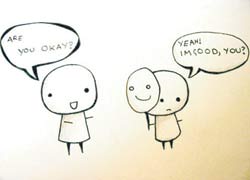The unhappiness within
Every generation of children that enter this modern world has a different way of dealing with life. Their habits, choices, hobbies and attitudes all depend on the time period they are born in. The children and youth of today have a supposedly easy life due to the availability of numerous technological advancements. However, even with so many facilities available that our parents never even knew of, the youth of today is unhappy and depressed. This phenomena, unfortunately, exists world over.
This comes as a surprise because the society has lesser restrictions than before and one can achieve anything they want. Honestly, we have the world at the click of our fingers! This was not even possible a few years back and the generations that have spent half of their lives without computers and the internet understand how blessed we are. The important question here is, is the youth grateful for what they have?
According to a study published in an American journal, ‘Children’s Society’, children aged between eight and 17 began to feel a stall in happiness in 2008 and it has recently been in decline. This study was conducted following interviews with 42,000 people of the specified ages.
These finding are actually incredibly worrying since they are proof of how disturbed and depressed the society as a whole could become in the future. No, don’t sweep this problem aside by simple labelling it as ‘teenage grumpiness’. After all, we were teenagers once too and I, for one, don’t remember being as unhappy as the youth of today.
The fact is that if the youngsters seem to have a low-attitude, it is the job of their parents, institutions and even the government to identify the problem and help them. We can’t just sit here and watch as they struggle with serious issues including self-harm and suicidal thoughts.
So the next important question here is, why is the youth so unhappy? Here are a few reasons that end up causing teens and children to feel low and depressed.
The material world
Let’s face it, not everyone is privileged enough to spend exorbitant amounts of money to fulfil their desires. But, in today’s world, all we seem to be left with is a craving to have more. This initially starts off with wanting more pocket money and then the demands increase to expensive cell phones. Today, seven-year-old children own iPhones whereas in my time I had to beg my parents to place a normal phone in my room. Asking them to buy a cordless was an issue as the device comparatively cost more than the common phone.
Unfortunately, the demands of the youth are increasing day by day while the income of the families remains the same. The problem is, no one is concerned about what someone of a specific age is allowed to own and parents seem to be making a special effort to shower their children with gadgets and other expensive items. For boys, they need a good watch, a play station, iPad, cellphone and a laptop. And these are just the basic ‘necessities’!
Girls, on the other hand, want expensive toys (imported right from USA), perfumes, flashy clothes, cell phones, etc. What’s worse is that both the genders associate happiness and wellbeing with the possession of these items. The result: an unhappy youth.
Whether you like it or not, you can’t posses everything in this world. For instance, I can buy an expensive phone today but it will become obsolete in two years. The lesson here is not to eliminate the want for a good phone, but to eradicate the constant need to update what we own. It’s like we buy something and after six months to a year, a better version of it is launched. This not only creates competition amongst kids but also creates envy, materialism, hatred and depression.
The problem becomes worse as we grow up because there is an unlimited amount of brand, gadgets and cars in this world and not everyone is rich enough to posses all of these items.
If you are one of those who keep wanting more, try to understand that these wants are created by companies who are simply trying to milk money out of you by creating things you don’t really need. An example of this is the iPod. Before this device was launched, we had MP3 players that were portable and had almost the same function. That’s when iPods were launched and they instantly became a necessity even though MP3 were providing us with the same service. But the expensive iPods were marketed in such a way that we began to see them as an accessory for fun. Let’s admit it: Steve Jobs was brilliant in creating a want for something we didn’t really need. iPods are so popular now that children and adults alike are constantly craving to buy the latest version, i.e. constantly yearning for more money to spend. And what happens when we are unable to possess this device? Yes, you guessed it right, we feel down in the dumps.
The bottom line is there is no end to the material things that can be created. It is up to us to take charge of our wants and envy. Be happy with what you have and stop resenting those that have more.
Looks that kill
Another aspect that causes unhappiness in teenagers nowadays is the emphasis on appearance. Unfortunately, all forms of media seem to be promoting an unrealistic, ‘ideal’ version of beauty and youngsters are more likely to get influenced by this image. Girls are made to believe they need to be tall, skinny and fair while boys are also encouraged to be tall and muscular.
Now imagine, how would a 15-year-old feel about himself if the set standard of being good looking is to be like David Beckam? How would a teenage girl feel if, in the eyes of the world, stars like Jennifer Lopez and Angelina Jolie define beauty?
 Guys, the fact here is that these stars are groomed on a daily basis and it is their job to look good. Hence, a team of stylists, makeup artists and trainers are always behind them to make them look the way they are. Also, it is impossible for someone who is 15 to have a curvy body like these Hollywood starlets or to create muscles like football stars and actors. Always remember that your body develops with time and rushing yourself into looking a certain way is an unachievable goal that will only leave you feeling unsatisfied and inferior. Last but not the least, everyone looks different and you don’t need to feel inferior only because you are too short or too tall.
Guys, the fact here is that these stars are groomed on a daily basis and it is their job to look good. Hence, a team of stylists, makeup artists and trainers are always behind them to make them look the way they are. Also, it is impossible for someone who is 15 to have a curvy body like these Hollywood starlets or to create muscles like football stars and actors. Always remember that your body develops with time and rushing yourself into looking a certain way is an unachievable goal that will only leave you feeling unsatisfied and inferior. Last but not the least, everyone looks different and you don’t need to feel inferior only because you are too short or too tall.
Dress to impress
According to a study published in the American journal, ‘Children’s Society’, one of the reasons youngsters are unhappy is because they are under constant pressure to dress a certain way. People are forced to wear certain clothes because they are ‘in fashion’ and dressing differently leads to one getting rejected by their peers. Hence, by copying a certain trend, one loses their individuality and undergoes a constant pressure to fit in.
The fact is, fashion, too, is an accessory of consumerism as companies and designers sell their products by creating the want of dressing a certain way. This thought is marketed by using television to constantly promote a certain attire in ads and TV series. You see, everything that surrounds us has a subconscious impact on our desires.
Why do you think the typical shalwar kameez style has been discarded in Pakistan and replaced with kurtis paired with tights? Can our national dress suddenly become ‘unfashionable’? The answer is no. The redesigning of clothes is simply a way for designer stores to sell more of their creations.
The only way out of this cycle of following fashion is to realise how our minds are being manipulated. If youngsters haven’t realised this, the parents should at least reveal these aspects of the world to them. Just be yourself and create your own sense of style. What’s in or out is a factor that should be irrelevant to your lives.
Be happy
With so much love for the material world and low self-esteem existing within most of us, it is natural that achieving happiness becomes a difficult task. However, nothing is impossible and you can be content with your life by altering your lifestyle and perception. Here are some tips that you can follow:
Practice gratitude: This is a seemingly simple strategy, but it can make a huge difference in your outlook. Keep a journal and note down things that you are grateful for everyday. Making this a habit will turn you into a positive person because you will finally be able to look at all that you do have instead of focusing on everything you don’t have. Studies have also revealed that this practice will increase one’s happiness and life satisfaction while decreasing depressive symptoms.
 Sleep more: According to a study in the BPS Research Digest, those who sleep more are less sensitive to negative emotions. Those who sleep more are fresh and happy while sleep-deprived people fail to recall pleasant memories and focus gloomy memories. Hence, quit that habit of sleeping late and sleep well so you can wake up happy.
Sleep more: According to a study in the BPS Research Digest, those who sleep more are less sensitive to negative emotions. Those who sleep more are fresh and happy while sleep-deprived people fail to recall pleasant memories and focus gloomy memories. Hence, quit that habit of sleeping late and sleep well so you can wake up happy.
Spend more time with family and friends: The fact is money can’t buy happiness, but the company of your family and friends can surely uplift your mood and make you feel loved. Even if you don’t have that phone or PlayStation 4 you wanted, you will forget all about it amidst the ones you love. Several studies have found that time spent with family and friends can make a big difference to how happy we feel. Happiness expert from Harvard, Daniel Gilbert, said, “We are happy when we have family, we are happy when we have friends and almost all the other things we think make us happy are actually just ways of getting more family and friends.”
Get outside more: One study found that spending 20 minutes outside in good weather not only boosted positive mood, but broadened thinking and improved working memory. Being outdoors, near the sea, on a warm, sunny weekend afternoon can be the perfect spot.
Help Others: To make yourself feel happier, you should help others. How does this work, you ask? Well it’s simple. When you know you are responsible for making life better for others, you feel content with yourself. Spending money on other people makes us happier than buying stuff for ourselves.
 Meditate: Rewire your brain for happiness through meditation. Meditation is often touted as an important habit for improving focus, clarity, and attention span, as well as helping to keep you calm. It is also useful for improving your happiness as it literally clears your mind and can actually make you happier in the long-term. Studies show that in the minutes right after meditating, we experience feelings of calm and contentment as well as heightened awareness and empathy.
Meditate: Rewire your brain for happiness through meditation. Meditation is often touted as an important habit for improving focus, clarity, and attention span, as well as helping to keep you calm. It is also useful for improving your happiness as it literally clears your mind and can actually make you happier in the long-term. Studies show that in the minutes right after meditating, we experience feelings of calm and contentment as well as heightened awareness and empathy.